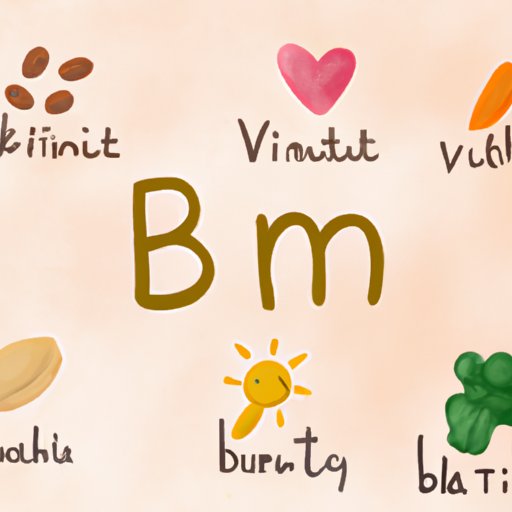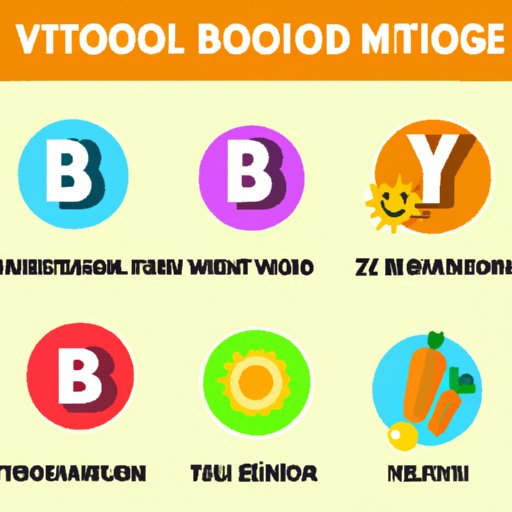
Introduction
Vitamin B is a crucial nutrient that is essential for maintaining good health and promoting overall well-being. However, many people struggle to obtain enough Vitamin B in their diets, which can lead to various health problems. In this article, we will explore the different types of Vitamin B, their importance, and the foods that are the best sources of this nutrient.
Unlocking the Mystery: Where to Find Vitamin B in Your Food
There are many different types of Vitamin B, each with its unique benefits and functions. Some of the most common types of Vitamin B include:
- Vitamin B1 (Thiamin)
- Vitamin B2 (Riboflavin)
- Vitamin B3 (Niacin)
- Vitamin B5 (Pantothenic Acid)
- Vitamin B6 (Pyridoxine)
- Vitamin B7 (Biotin)
- Vitamin B9 (Folate)
- Vitamin B12 (Cobalamin)
Each type of Vitamin B is found in different types of foods. For example, Vitamin B1 can be found in whole grains, peas, and beans, while Vitamin B12 is mostly found in animal products like fish, meat, and dairy products.
It’s important to get a variety of different types of Vitamin B in your diet to ensure that your body is getting all of the benefits that this nutrient can offer.
From Meat to Greens: A Comprehensive List of Vitamin B Sources
Here is a comprehensive list of Vitamin B rich foods:
- Meat and poultry: Beef, chicken, turkey, and pork are all excellent sources of Vitamin B12.
- Fish and seafood: Salmon, tuna, and shellfish are all good sources of Vitamin B12.
- Dairy products: Milk, cheese, and eggs are all good sources of Vitamin B12.
- Whole grains: Whole wheat, brown rice, oatmeal, and barley are all good sources of Vitamin B1.
- Nuts and seeds: Sunflower seeds, almonds, and peanuts are all good sources of Vitamin B3.
- Beans and peas: Lentils, kidney beans, and peas are all good sources of Vitamin B1.
- Leafy greens: Spinach, kale, and broccoli are all good sources of Vitamin B9.
- Fruits: Citrus fruits like oranges and lemons are good sources of Vitamin B9.
It’s important to note that some of these foods are better sources of certain types of Vitamin B than others. For example, animal products like meat, poultry, and dairy products are the best sources of Vitamin B12, while leafy greens and fruits are the best sources of Vitamin B9.
Why Vitamin B is Vital for Your Health and Where You Can Get It
Vitamin B plays a crucial role in many of the body’s processes. It helps to promote the production of red blood cells, maintain healthy skin and eyes, and support the proper functioning of the nervous system. Additionally, Vitamin B is essential for converting food into energy, so without enough Vitamin B in your diet, you may feel lethargic and tired.
To ensure that you are getting enough Vitamin B in your diet, it’s important to eat a variety of foods that are rich in this nutrient. If you’re unable to get all of the Vitamin B that your body needs from your diet alone, you can also consider taking a Vitamin B supplement.
The Top 10 Vitamin B Foods for a Balanced Diet
Here are the top ten Vitamin B rich foods that you should try to incorporate into your diet:
- Clams
- Beef liver
- Tuna
- Nutritional yeast
- Brewer’s yeast
- Sunflower seeds
- Pork
- Asparagus
- Salmon
- Eggs
These foods are all excellent sources of one or more types of Vitamin B, making them a great addition to any balanced diet.

How Vitamin B Boosts Your Energy and Immune System
As previously mentioned, Vitamin B plays an important role in converting food into energy. When your body doesn’t have enough Vitamin B, you may feel fatigued and sluggish. Additionally, Vitamin B has been shown to help boost the immune system, which can help to protect against illness and disease.
To ensure that you are getting the maximum benefits of Vitamin B, it’s important to make sure that you are getting enough of each type of this nutrient. By eating a balanced diet that includes a variety of foods that are rich in Vitamin B, you can help to ensure that your body is getting all of the benefits of this essential nutrient.
A Breakdown of the Different Types of Vitamin B and Their Functions
Here is a breakdown of each type of Vitamin B and what it does for your body:
Vitamin B1 (Thiamin)
Vitamin B1 helps to facilitate the conversion of food into energy. It also helps to support the proper functioning of the nervous system and is essential for maintaining healthy skin, eyes, and hair.
Vitamin B2 (Riboflavin)
Vitamin B2 helps to support the production of red blood cells and helps to convert food into energy. Additionally, it helps to maintain healthy skin, eyes, and hair.
Vitamin B3 (Niacin)
Vitamin B3 helps to support the proper functioning of the nervous system and helps to convert food into energy. Additionally, it helps to maintain healthy skin, eyes, and hair.
Vitamin B5 (Pantothenic Acid)
Vitamin B5 helps to convert food into energy and is essential for maintaining healthy skin and hair.
Vitamin B6 (Pyridoxine)
Vitamin B6 helps to support the production of red blood cells and helps to convert food into energy. It also helps to maintain healthy skin and eyes.
Vitamin B7 (Biotin)
Vitamin B7 helps to support the proper functioning of the nervous system and helps to convert food into energy. Additionally, it helps to maintain healthy skin, eyes, and hair.
Vitamin B9 (Folate)
Vitamin B9 helps to support the production of red blood cells and is essential for proper fetal development during pregnancy. Additionally, it helps to maintain healthy skin and hair.
Vitamin B12 (Cobalamin)
Vitamin B12 helps to support the production of red blood cells and is essential for maintaining a healthy nervous system. It is mostly found in animal products.
Vegetarian and Vegan-Friendly Sources of Vitamin B to Add to Your Diet
Vegetarians and vegans can still obtain sufficient amounts of Vitamin B in their diets by incorporating some of the following foods into their meals:
- Nutritional yeast
- Brewer’s yeast
- Fortified cereals
- Fortified plant-based milks
- Tempeh
- Seitan
- Green leafy vegetables
- Beans and peas
It’s important for vegetarians and vegans to pay attention to their intake of Vitamin B12 specifically, as it is mostly found in animal products. They may need to consider taking a supplement to ensure that they are getting enough of this nutrient.
Conclusion
Vitamin B is a crucial nutrient that is essential for maintaining good health and promoting overall well-being. By incorporating a variety of Vitamin B rich foods into your diet, you can help to ensure that your body is getting all of the benefits of this essential nutrient. Whether you’re a meat-eater, vegetarian, or vegan, there are plenty of foods that you can include in your diet to help you get the Vitamin B that your body needs.
To ensure that you are getting enough Vitamin B, it’s important to eat a balanced diet that includes foods from a variety of different food groups. You can also consider taking a Vitamin B supplement if you’re not getting enough of this nutrient from your diet alone.





